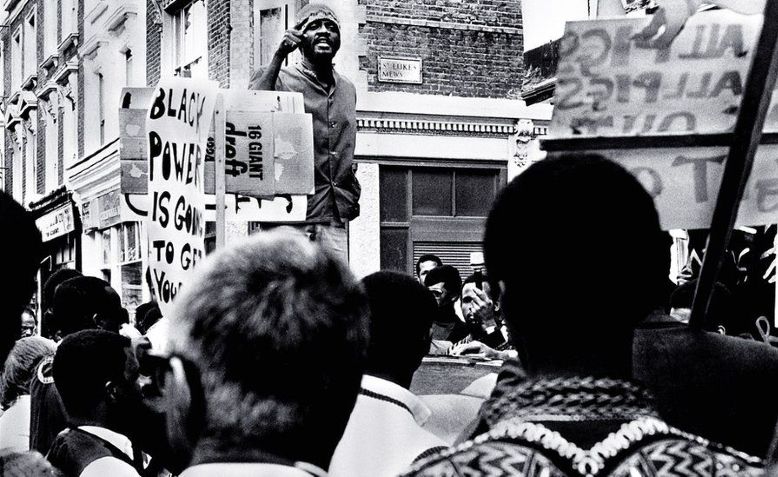 Caption: Photo: Black Power: A British Story of Resistance, BBC
Caption: Photo: Black Power: A British Story of Resistance, BBC
The BBC’s new documentary offers an examination of the strengths and weaknesses of the British Black Power movement and the lessons we can take today, finds Yonas Makoni
“I think the youngsters in the Black Lives Matter movement need to appraise themselves of what came before, so that they can draw some lessons from the battles we fought and won.”
So argues Linton Kwesi Johnson in the opening of Black Power: A British Story of Resistance. George Amponsah’s excellent new documentary provides a fascinating, nuanced and educational perspective on the small but influential British Black Power movement of the 1960s and 70s.
Produced by Small Axe’s Steve McQueen and narrated by Daniel Kaluuya of Get Out and Judas and the Black Messiah, the film illuminates the context and political stakes that led the British West Indian, African and Asian youth of the post-war period to engage in radical politics. But in the wake of contemporary movements against racism, inequality and police violence, it is also a timely reminder that many of the problems facing the black youth of the era remain largely unsolved.
Beginning in early 60s, the film sets the scene for the myriad problems facing the new wave of post-war migrants and ethnic minorities in Britain: rampant poverty, police and mob violence and an increasingly politicised racist culture, exemplified by the rise of figures such as Peter Griffiths and Enoch Powell.
Griffith’s notorious 1964 general election campaign slogan and Powell’s ‘Rivers of Blood’ speech were emblematic of the increasing boldness of racists in appealing to the basest instincts of the white majority. While widely condemned in respectable circles, the state and wider establishment largely turned a blind eye to these developments – as the film shows it took 12 years and three amendments for the Race Relations Act to come close to meaningfully legislating and enforcing against discrimination.
It was against this backdrop that black people in Britain began to adopt an increasingly confrontational and radical attitude towards the state and society. In Black Power, documentary footage from the period is mixed with interviews with participants in the movement, with famous figures such as Linton Kwesi Johnson, Darcus Howe, Altheia Jones-Lecointe and Michael X making frequent appearances.
The interviewees recount the disgusting climate of endemic racial discrimination, poverty and othering they faced from childhood. The film shows, for instance, how black children were falsely labelled as ‘educationally subnormal’ and sent to inferior ‘ESN’ schools, as also depicted in McQueen’s final Small Axe film.
It also vividly depicts the terror that the police inflicted on black communities. Two former Met officers give wildly different, but equally disturbing accounts of their work in Brixton. One cries as he tells of how he stood by while watching his colleagues brutally beat someone they had arrested at a house party.
Another dismisses black hostility to the police, arguing “there’s an old saying that a community gets the policing it deserves”. He goes on: “Not believing that I would do a professional job? Who had the prejudice?”
Unlike their parents, however, many of these young people had grown up in Britain and could not accept being treated as second-class citizens. “Black Power for us meant we weren’t going to take any rubbish, we weren’t going to be victims”, recounts Winston Trew of the Fasimbas (and one of the Oval Four).
The film charts the constellation of radical groups this generation of activists formed under the influence of figures such as Malcolm X and Stokely Carmichael. It takes seriously the young people’s revolutionary commitment and unusually avoids downplaying or patronising it. While heavily focused on the numerous passionate orators and charismatic personalities that led and sometimes tried to hijack the movement, it is careful to not reduce it to these figures. It is clear that black youth were not manipulated but forced into radical politics by the injustices of their country.
The film ends by giving its account of the decline of the Black Power movement and its limitations. Leila Hassan Howe astutely argues:
“Money was being poured into the black community for projects to try to defuse the demands that were being made. So if your demand was for decent housing for black men, they would give you money for a hostel. So the demand for decent housing was defused because they didn’t get decent housing, they got a hostel… but the hostel was run by a black person.”
But the film also highlights the movement’s unfortunate tendencies towards gangsterism and adventurism, as with the case of the Spaghetti House siege – an incident where a group of Black Power activists were besieged by the police after attempting an armed robbery on an Italian restaurant – which one interviewee credits with his disillusionment with revolutionary politics.
These tendencies, as well as the short but tumultuous life of the movement, point towards weaknesses in the politics of the Black Power movement, which, while admirably militant and revolutionary, was often lacking when it came to questions of long-term strategy.
As contemporary movements from Black Lives Matter to Kill the Bill show, the problems that faced the black youth of the 60s and 70s are far from solved. This film shows that we must learn from both the strengths and weaknesses of their movements, if we want to go beyond them.
Black Power: A British Story of Resistance is available to watch on BBC iPlayer
Join Revolution! May Day weekender in London
The world is changing fast. From tariffs and trade wars to the continuing genocide in Gaza to Starmer’s austerity 2.0.
Revolution! on Saturday 3 – Sunday 4 May brings together leading activists and authors to discuss the key questions of the moment and chart a strategy for the left.

